- Home
- Nevil Shute
Complete Works of Nevil Shute Page 3
Complete Works of Nevil Shute Read online
Page 3
He looked at me suspiciously. “You’re not going to give me up?”
I told him to talk sense. “For one thing,” I said, “I could give you away now without bothering to get you into a trap, simply by going away and telling people that I’d seen you here. But here I am. I’ll do what I can for you if you’ll let me, or if you don’t want any help I’ll go away and forget I’ve seen you. Now that’s square.”
He motioned to me to come close; he seemed suddenly afraid. “It’s most frightfully good of you,” he said, “and I do want a bit of help. It’s a thing that you can do quite easily, without any risk to yourself. There’s a house about four miles from here on the other side of Stokenchurch. The house is called Six Firs. It’s not my home — I daren’t go near home. They’ll be on the look-out for me there. But there’s a cousin of mine lives with her people in this house — a girl, oh, a damn good sort. She’ll fix me up if she knows I’m here. Go to the house and get hold of her, and tell her. Don’t let her people know — they’re too old. Tell her I’ll be outside the house from eleven o’clock onwards. Tell her to leave the morning-room window open and to switch on the light in her bedroom when it’s safe for me to come in.”
“She won’t believe me if I go and tell her that,” I said. “No girl would. She’d think I was trying it on.”
He gripped me by the arm. “You’ve got to make her believe,” he said. “You’ve got to — you simply must. I must see her — she may have heard — she may know something. Man, I tell you, I’ve got to be free for the next ten days. After that.... But she may know what’s happening.”
He was becoming rapidly incoherent. I freed myself gently from his grip on my arm.
“I’ll do the best I can,” I said. “Six Firs, at eleven o’clock, with a light in her bedroom window. By the way, what’s her name?”
“Stevenson,” he said, “Joan Stevenson. My name is Compton.”
“Right you are,” I said. “I’ll go there and do the best I can. And see here — if I can’t convince her I’ll be near the gate myself at eleven o’clock tonight. Now you’d better cut off into cover.”
He turned and ran into the wood through the trees till he was out of sight. I noticed that he ran with a limp.
Well, there I was — and the devil of a fine position to be in, too. I turned and walked unsteadily towards the machine. She was in a shocking mess. I looked first at the engine. One of the connecting-rods had poked its way through the side of the crankcase and made a hole big enough to put my head into; through the hole one could see the mincemeat inside. I judged the machine to be a complete write-off; the port wings crumpled up and the fuselage badly injured close behind the engine. It was the worst crash I had had since the war.
I stood looking at it all for a minute, and it struck me that I was very lucky to have got out of it alive. It was now a quarter of an hour or more since it had happened, and nobody had arrived in the field. And then I thought that if Compton had not turned up I should still have been in the machine, pinned upside down, unconscious and dying — if not already dead. The thought of it fairly made me sweat with fright.
I was feeling much better by now. My neck had had a beastly wrench, but I could walk without holding on to it, and apart from that I was hardly hurt. I left the machine and began to walk along the edge of the wood in the direction of Stokenchurch. In all the half-mile that I walked through the fields to the road I never saw a soul. It was evident that nobody had seen me come down; that wasn’t difficult to understand, because it was a brute of an evening and I had been flying very low above the trees, half hidden in the clouds. As I went on through the fields and met nobody I realized that I owed my life to this fellow Compton. I don’t imagine that my life is worth much or that I’ve ever done much good with it; at the same time — it’s all one has. And then as I walked on I knew that it was up to me to see this business through to the end and to back Compton in every way I could — even if it were to mean another spell in quod for me. Looking back now over the years I’m glad to be able to remember that I stuck to that decision, and backed him till he had no further need of me.
I went on, and presently I came to a road. A little way along it I met a Ford van delivering groceries to some outlying village. I stopped it and asked the boy for a lift in to Stokenchurch. He stammered and looked at me as if I was a ghost, said something in refusal, and tried to drive on. I jumped on to the running-board, leaned in over the wheel, and soon put a stop to that. And then I realized that appearances were against me. The hand that I switched off his engine with was covered in blood and oil; I had no hat and I could feel that something had happened to my hair. I discovered later that there was a deep cut over my right eyebrow that had bled all down the side of my face; it was drying now and my hair was all stuck up with blood on my forehead. I had been feeling so generally ill that I hadn’t noticed it.
I told the boy what had happened. When I got him to believe me, his one idea was to go off and have a look at the machine. I told him I was going into Stokenchurch in his Ford whether he drove me or not. He perked up a bit at that, but I pretty soon unperked him, and at last we got going on the road to Stokenchurch.
We got to Stokenchurch at about half past five. I went straight to the inn, postponed giving an account of myself and got on the telephone to Morris, while the crowd fluttered about outside and peeped in at me through the door of the room.
I told him what had happened. “I hadn’t an earthly,” I said. “The clouds were right down on to the hills I was only a hundred feet up when the engine conked. I told you it was running rough. What? Oh, yes, the machine’s a write-off — absolutely, I’m afraid. What’s that? Well, I can’t say that it worries me much — only too glad to be well out of it. I don’t give a damn about the machine. Yes, I dare say you do, but that’s your worry. Oh, nothing to write home about, thanks. I got shaken up a bit and cut my eyebrow — nothing serious. I’m sorry it’s happened, but I’m not taking any responsibility for it at all. I told you I wasn’t fit to go. As a matter of fact, fit or not, it wouldn’t have made any difference to what happened.” Which was a lie.
Rather to my surprise he said he was sending down the breakdown gang at once, and told me to fix up a meal for them. I rang off, and immediately found myself the sensation of the evening. I should think half the village crowded into the passages of the pub, all eager to see me and condole before I had my face washed. I managed to get away from the crowd, and the landlord’s wife took me upstairs and bathed my eyebrow for me; I would have preferred the barmaid, but didn’t like to say so. It was a clean cut and she made quite a good job of it for me, fixing it up with a bit of lint and sticking-plaster. Then I went down and saw the landlord and arranged about a meal for the mechanics over a stiff whisky.
Presently I began to throw out feelers about the Stevensons, and the house called Six Firs.
I said that I thought I knew some people called Stevenson who lived near Stokenchurch; at least, I knew of them but had never met them. He said that they would be the people at Six Firs. I was told that the house was about a mile from the village; with a little encouragement he told me the whole family history — so far as there was anything to tell. Arthur Stevenson, Esq., CB, was a man of about seventy, several years retired from the Treasury. His wife was only a little younger, and both were passionately fond of gardening. They always took first prize for sweet-peas at the local flower show. Before moving to Stokenchurch on their retirement they had lived for thirty years in Earl’s Court. Their pew in church was close under the pulpit because the old lady was getting very deaf. There was a son in India, a major in the Indian Army. There was a daughter about twenty-five years old who lived at home and painted pictures — water colours, I gathered — which had been exhibited at High Wycombe. They had a Morris Cowley which the daughter drove. The barmaid had a cousin who was their cook. That was all.
I said that my father had been at school with old Mr Stevenson, and I thought that I would walk up
and call on them. He offered to send a boy with me to show me the house, but I got out of that and got directions instead. I borrowed one of his hats, and set off up the street.
As I went I realized the utter futility of the whole thing. It was impossible that such a household should shelter an escaped convict. It struck me at once that it wasn’t fair on the old people; at all costs they must be kept out of it. It was evident that if there was any help at all coming from that house it must come from the girl; I can’t say that I was too sanguine about her. From the landlord’s description she sounded a blue-stocking of the most virulent description; it seemed to me that water-colours and escaped convicts were unlikely to go well together. Evidently I must try the house, but I thought it was more probable that Compton would have to stay in the woods for a day or two till I could get some clothes for him and smuggle him away.
As I drew nearer to the house I began to wonder how I should get hold of the girl without her parents. A succession of ideas passed through my head and were rejected one by one. I might say that I was soliciting custom for a projected milk round — but that wouldn’t work in the country. Nor would the gas-meter do, where there was probably no gas. Finally, I fixed on the car as being the one thing in the house that would be solely the domain of the daughter, and decided to make that my line of attack.
The house was a pleasant-looking place on the wooded side of a hill, standing well back from the road in three or four acres of land. It was not a large house, but it was beautifully cared for; the gardens were small, but very neat. There was a large paddock with a decrepit-looking pony in it. It was about seven o’clock when I got there; the rain had stopped and the clouds were clearing off before the sunset. The garden smelt wonderful after the rain.
I rang the bell and a maid came to the door. “Can I see Miss Stevenson?” I said. “It’s about the car — I’m from the garage.”
The maid went in and a girl came to the door. She must have been in the hall.
“It’s about the car?” she said. “You’ve come from Weller’s?”
That was the first time I met Joan Stevenson. I wish I could recall that first interview a little more clearly. She was a tall slim girl with grey eyes, by her complexion a country girl, rather plain and — which seemed strange to me — without a trace of powder or make-up. She had very soft brown hair, bobbed; she was wearing a brown jumper, a skirt that looked like corduroy, and brown brogues. She looked me straight in the eyes when she spoke, which worried me and made me nervous.
I produced a jet from my waistcoat pocket. “It’s about the carburettor on your car, Miss,” I said. “The makers sent a letter round to us agents to say as some cars was issued from the factory wiv jets as gives trouble in the morning, starting from cold, like. They was to be replaced without charge. So as I was passing along this evening the manager told me to look in.”
“It’s very good of him,” said the girl, “but she’s always been very easy to start. Beautiful.” I could see that she was puzzled.
“Could I just ‘ave a look at her,” I said, “if it won’t be inconveniencing? ‘Course, if she’s going all right, I says leave well alone. There’s a sight more damage done messing them about than what there is leaving them alone. But if I might look to see what number jet she has got in, an’ then I can tell the boss.”
She took me round to the back of the house, and there was the car standing in the coach-house with the doors open. We went into the coach-house, but I didn’t open the bonnet of the car. Instead, I straightened myself up.
“Miss Stevenson,” I said, “I haven’t come about the car. I’ve come about your cousin, Compton — I don’t know his other name. He sent me here to see you. He wants help.”
She looked at me incredulously. “He sent you here?” she repeated.
“I saw him this afternoon,” I said. “I’m afraid he’s in trouble. He broke prison apparently — he’s been in prison, hasn’t he? He’s in the woods close here, and he wants help to get a change of clothes and get away.”
“Who are you?” she asked.
I could see that this interview wasn’t going at all well. I didn’t see what else I could do but to plough ahead and tell her exactly what had happened; if then she chose to disbelieve it I should have done my best. “My name is Stenning,” I said. “Philip Stenning.” I set out to tell her all that had happened to me that afternoon. When I got to the bit about Compton coming out of the wood and pulling me out of the machine she stopped me.
“I’m sorry, Mr Stenning,” she said, “but I don’t believe a word of all this. It’s quite true that my cousin is in prison, but I don’t believe a word of the rest of it. You shouldn’t have brought in the aeroplane, you know; it’s laying it on a bit too thick. As a matter of curiosity, what were you going to ask me to do?”
I laughed; it was the only thing to do. “For one thing,” I said, “I was going to ask you to believe me. I was going to ask you to put out food and clothes for your cousin in the morning-room at about eleven o’clock tonight after your people have gone to bed, and to leave the morning-room window open and to switch on the light in your bedroom when the coast was clear. But I’m afraid you’ll find that as melodramatic as the aeroplane.”
She smiled gravely. “I’m afraid I do, Mr Stenning. Much too sensational. Now I’m going to go down to the police station tomorrow morning and tell them all about you, so you’d better run away back to London tonight. It’s an ingenious tale and for the moment you very nearly took me in, but you spoilt it by bringing in the aeroplane. You wouldn’t have got very much out of this house, though. There’s only the silver forks and things and I don’t think they’re worth very much. We shall have to put them in the dog-kennel or somewhere tonight, shan’t we? Now you’d better go.”
“Right you are,” I said. “You can go to the police station, and they’ll probably tell you who I am. But, for God’s sake don’t tell them anything about your cousin being out in the woods, because he’ll have to stay there for tomorrow till I can get him some clothes. So if you go telling the police where he is there’ll be hell to pay.”
She wrinkled her forehead in perplexity, but before she could speak I stopped her.
“Look here, Miss Stevenson,” I said, “I know you don’t believe me. But walk down to the village after dinner and collect the local gossip. I promise you that you’ll find that an aeroplane crashed this afternoon, and that I’m the pilot. If you find that’s true you can take a chance on the rest of the yarn. If you leave the morning-room window open and hide behind the curtains with the morning room poker you can hit him on the head as he comes in and examine him at your leisure. I promise you you’ll find he’s your cousin.”
She looked at me seriously. “If I find that’s true,” she said, “we may owe you a great deal, Mr Stenning. But my cousin has only six months of his sentence left to run.”
“Then he must have a pretty good reason for wanting to be out,” I said. “Well, we’ll leave it at that, Miss Stevenson.”
I walked back through the lanes to the village. It was a wonderfully quiet evening; the clouds and the storm were rolling away towards the east and the sunset was clear. The birds had come out again, and I remember there was a thrush calling somewhere in the trees. It was a long time since I had been in the country. It was time I took a holiday. I thought of the aerodrome and the machines and Manchester and my flat in Maida Vale, and the more I thought of them the more I hated them. I thought what a fool I was to live that sort of life. I didn’t want to go back.
When I got back to the pub I found the local constable waiting for me to give account of myself; he seemed a little hurt that I had not come to do so of my own accord. I was a bit short with him till I remembered that this case was probably the most important that he had had to deal with for six months; then I loosened up and stood him a drink. By the time that had gone down the lorry had arrived with the breakdown gang.
I went out and had a chat with the foreman of the men; he
clucked his tongue when he heard what had happened, and opined that I was lucky to have come off so lightly with nobody there to help me out of the machine. I passed that off without a blush and hoped that his practised eye would not betray me when we came to the wreck, and then, though it was after eight o’clock, we went off in the lorry to get the machine. We found her as I had left her, lying on her back by the wood surrounded by a crowd of yokels. The ground was hard, being summer, so that we could get the lorry right up to her; the foreman clucked his tongue some more and set the men to work. An aeroplane comes to pieces very easily. In twenty minutes the wings and the tail were off and we were loading the fuselage on to the lorry; in an hour and half we were back in Stokenchurch just as it was getting dark.
We passed Joan Stevenson in the village street. I stopped the lorry, jumped down clumsily in my heavy coat, and went to speak to her. I pointed to the wreckage.
“There it is,” I laughed. “I was just bringing it along to show you.”
In the dusk I could see that her face was very white. I sent the lorry on, and it rumbled away into the distance with the mechanics all telling each other that the captain was a quick worker.
“It’s terrible,” she whispered. “I’m so sorry I didn’t believe you when you told me this afternoon, Mr Stenning. What are we to do? Where is he now?”
“He’s in the woods,” I said. “I really don’t know what we can do. He’ll know what he wants to do, though.”
She nodded. “He’ll want clothes, won’t he? I found some old clothes of father’s that he’ll never miss. They’ll be a terrible fit. Father’s so much fatter.”
“We must get him something that looks as if it belongs to him,” I muttered, “or he’ll be caught at once. He’d better have this suit of mine till we can fit him out properly. We’re very much the same build.”

 On the Beach
On the Beach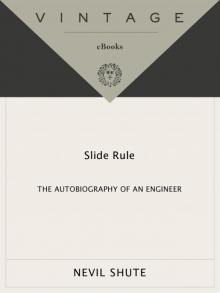 Slide Rule
Slide Rule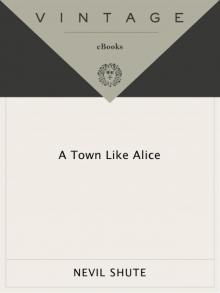 A Town Like Alice
A Town Like Alice The Far Country
The Far Country Pied Piper
Pied Piper Round the Bend
Round the Bend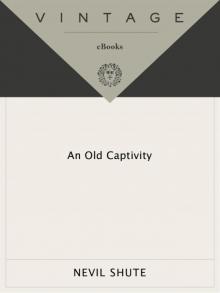 An Old Captivity
An Old Captivity Mysterious Aviator
Mysterious Aviator The Breaking Wave
The Breaking Wave Marazan
Marazan Lonely Road
Lonely Road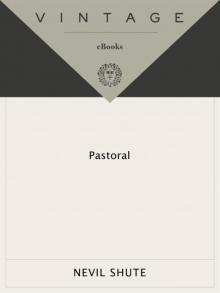 Pastoral
Pastoral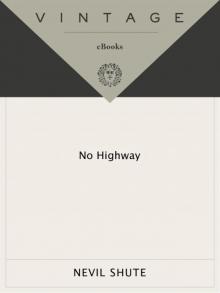 No Highway
No Highway Stephen Morris and Pilotage
Stephen Morris and Pilotage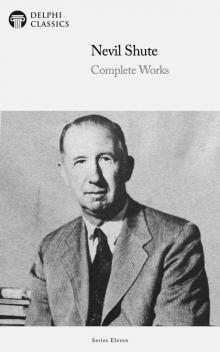 Complete Works of Nevil Shute
Complete Works of Nevil Shute Most Secret
Most Secret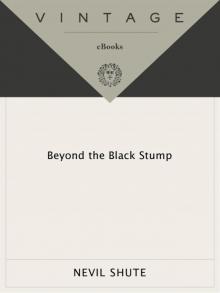 Beyond the Black Stump
Beyond the Black Stump The Rainbow and the Rose
The Rainbow and the Rose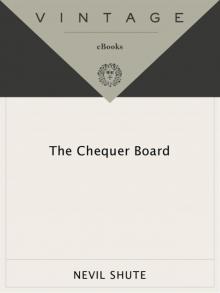 The Chequer Board
The Chequer Board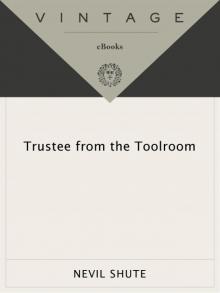 Trustee From the Toolroom
Trustee From the Toolroom Ordeal
Ordeal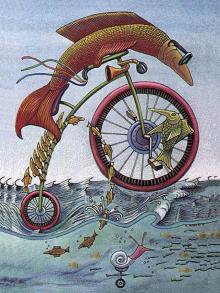 Stephen Morris
Stephen Morris